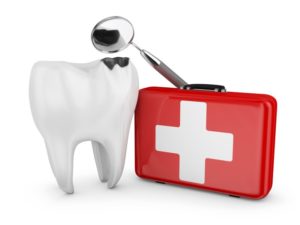
You use fluoride toothpaste to brush your teeth twice a day. You floss daily to make sure no food particles remain between your teeth. To top it all off, you even rinse with mouthwash every morning. But somehow, you still get more cavities than your friend who barely even flosses. Why is that? A dentist is here to explain five reasons why you might be more likely to get cavities.
1. Diet
When trying to cut cavities out of your life, the first thing you should look at is what you’re eating. Consuming too much sugar is an oral health mistake that far too many people make. Unless you brush and floss immediately after eating, sugar collects on and in between your teeth. The bacteria in your mouth then feast on this sugar and produce a harmful waste product that erodes tooth enamel, which is what causes cavities. Make some simple switches to cut down on this. Substitute Sodas, juices, and candy with water and crunchy fruits and vegetables, which naturally scrub your teeth clean as you chew them.
2. Oral Bacteria
The bacteria in some people’s mouths are more aggressive than others when reacting with sugars. This means that some people’s teeth are more vulnerable to acid attacks from these bacteria. To combat this, add rinsing with an antibacterial mouthwash to your daily dental hygiene regimen.
3. Tooth Shape
Some teeth, particular the molars, have naturally deep grooves that can trap bits of food and attract bacteria. Moreover, these grooves are harder to effectively clean than other parts of the teeth. This is why it’s crucial to brush as thoroughly as possible, especially your back teeth.
4. Receding Gums
If your gums pull back far enough, the roots of your teeth could be exposed, becoming easy targets for bacteria. Brush lightly with a super-soft toothbrush and fluoridated toothpaste to protect and strengthen these sensitive portions of your teeth. Additionally, visit your dentist to make sure that your gum recession is not indicative of a larger health problem.
5. Dry Mouth
If you feel thirsty all the time no matter what you do, your mouth might not have an adequate supply of saliva. This is detrimental to your oral health because saliva washes out food particles that promote bacterial growth. To keep your saliva flowing, drink plenty of water throughout the day and rinse daily with an enamel-enhancing mouthwash. Talk to your dentist if the condition doesn’t improve.
Just because you might be more prone to cavities doesn’t mean you can’t stop yourself from getting them. Follow these steps and your teeth should stay healthy and clean!
About the Author
Dr. Jon Davidson earned his Doctor of Dental Surgery degree from the University of Detroit Mercy. He is also a member of the American Dental Association, the Illinois Dental Association, and the Chicago Dental Society. He regularly takes well above the state of Illinois’ require amount of continuing education hours in order to stay up to date on the latest dental research. To contact his Skokie, IL practice, click here.
